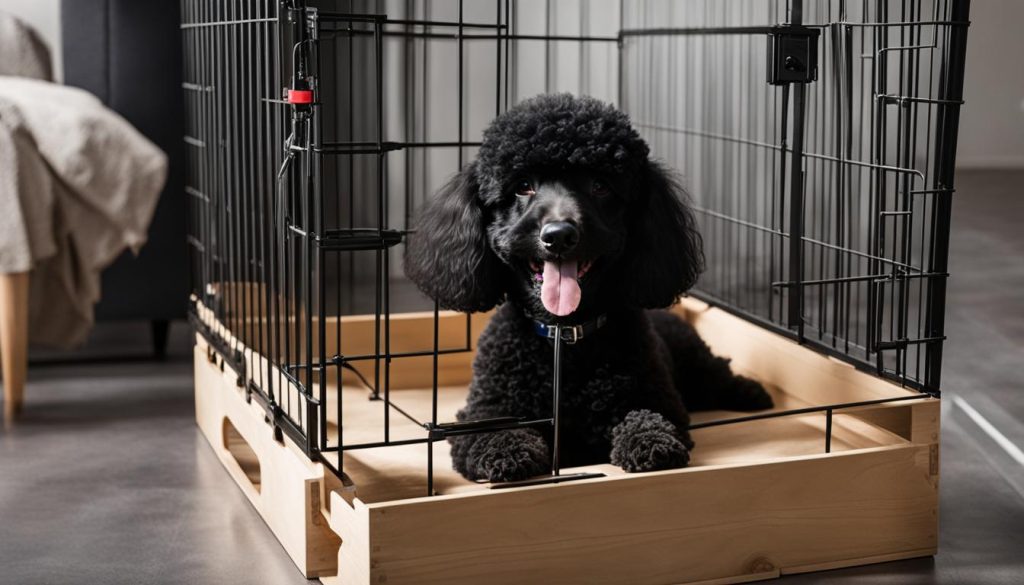Welcome to my guide on poodle training for first-time owners! If you’ve just brought home a poodle puppy or are considering getting one, it’s important to understand their unique needs and how to effectively train them. In this article, I’ll share valuable tips and techniques to help you navigate the world of poodle training.
Poodles come in three different varieties: Toy Poodles, Miniature Poodles, and Standard Poodles. Each variety reaches developmental milestones at different speeds based on their size. From transitioning from mother’s milk to puppy food, teething, weaning, and eventually leaving for their new homes, poodle development is a crucial period that requires proper care and attention.
Grooming is another essential aspect of poodle care. It’s important to start grooming early and get your poodle pup accustomed to the process. While professional grooming is recommended once the puppy has had all their shots, regular grooming maintenance should be introduced early to ensure their long-term health and happiness.
As for training, understanding poodle behavior is key to effective training sessions. Poodles are known for their intelligence and high energy. Their behavior largely depends on the training and environment they are raised in. With the right guidance and training techniques, you can harness their intelligence and create a well-behaved companion.
In the following sections, we’ll delve into the specifics of poodle training, including obedience commands, effective training methods, crate training, housebreaking, and more. By the end of this article, you’ll be equipped with the knowledge to embark on a successful training journey with your poodle.
Unravel Poodle Training
- Understanding the developmental milestones of your poodle is crucial for their overall health and well-being.
- Start grooming your poodle early to establish good hygiene habits and ensure their comfort with the process.
- Poodles are intelligent and high-energy dogs, making them easy to train if kept calm and focused during training sessions.
- Positive reinforcement and clear, firm commands are effective techniques for poodle training.
- Consistency and patience are key in building a strong bond and trust between you and your poodle.
Understanding Poodle Behavior for Effective Training
Poodles are known for their energetic and sometimes emotional nature, but their behavior can be easily managed through proper training and a positive environment. With their high intelligence and energy levels, Poodles are quick learners and respond well to obedience training techniques.
To ensure successful poodle obedience training, it is important to keep them calm and focused. The basic obedience commands for poodles include ‘come’, ‘sit’, ‘stay’, ‘down’, and ‘heel’. These commands form the foundation for a well-behaved poodle and create a strong bond between the dog and its owner.
Positive reinforcement is a highly effective method for poodle training. By rewarding desired behaviors with treats or praise, you can encourage your poodle to repeat those behaviors. Clear and firm voice commands are also essential to help your poodle understand what is expected of them.
Adding hand signals to your verbal commands can enhance your poodle’s understanding and response to your cues. This visual reinforcement can make training sessions more engaging and effective.
Start poodle obedience training from a young age to establish good habits and avoid potential behavior issues later on. Keep training sessions short and enjoyable to prevent frustration or boredom.
For comprehensive guidance on poodle training, there are various poodle training guides and books available. These resources provide step-by-step instructions, tips, and troubleshooting advice to ensure effective training for your beloved poodle.
The Intelligence of Poodles and Effective Training Methods
When it comes to intelligence, Poodles are often ranked as the second smartest dog breed. Their ability to quickly understand and recognize new training commands is truly remarkable. In fact, they can learn new commands with as few as five repetitions.
However, their high intelligence can also pose a challenge, especially when training a Poodle puppy. Their energy levels and inquisitive nature require advanced training techniques to keep them engaged and focused.
One effective approach is to start with teaching the basic commands such as ‘sit’, ‘stay’, ‘come’, and ‘down’. Once they have mastered these foundational commands, you can move on to more advanced training techniques.
One crucial command to focus on is ‘heel’. This command teaches your Poodle to walk calmly by your side on a leash. Mastering the ‘heel’ command can greatly enhance their overall training program, making walks more enjoyable and stress-free.
Another training technique that works particularly well with Poodles is crate training. Due to their innate ability to recognize behavior patterns, Poodles often respond positively to crate training. Introduce them to the crate gradually, making it a comfortable and safe space for them. It can be a valuable tool for housebreaking as well as providing a secure place for them to rest and relax.
When it comes to house training, starting early is key. Begin the process when your Poodle is still a puppy, as they are more receptive to learning at this stage. Consistency is crucial, along with positive reinforcement. Rewarding your Poodle for good behavior and using gentle corrections for mistakes will help them understand what is expected of them.
Poodles are highly adaptable dogs, and proper socialization is essential for their overall development. Exposing them to different environments, people, and other pets will help them become well-rounded and confident companions.
Combining positive reinforcement, advanced training techniques, and proper socialization will not only result in a well-behaved Poodle but also strengthen the bond between you and your furry friend.

Tips for Successful Crate Training and Housebreaking a Poodle
When it comes to crate training poodles, choosing the right size crate is crucial. The crate should be cozy enough to evoke the poodle’s “den” instincts but not too small to make them feel claustrophobic. To create a comfortable space, add soft bedding material and familiar toys to the crate.
Housebreaking a poodle should start at a young age. One effective approach is to use the crate to prevent accidents when the dog is unattended. By confining the poodle in the crate and then taking them outdoors after a period of confinement, you can reinforce that eliminating waste is acceptable only outside.
In order to ensure successful crate training and housebreaking, consistency and positive reinforcement are key. Establish a poodle training schedule for regular potty breaks, and reward your poodle with praise or treats when they eliminate outside. Avoid punishing accidents that occur inside the house, as it can confuse your poodle and hinder their progress.
Remember, poodle puppy training requires patience and consistency. Be sure to provide ample opportunities for your poodle to relieve themselves in the appropriate outdoor area and be consistent in reinforcing positive behaviors.
If you need further guidance on how to train a poodle, there are plenty of resources available, including poodle training books and online resources. Don’t hesitate to reach out to professional trainers or attend obedience classes with your poodle to enhance their training journey.

Creating a routine and providing a positive and comfortable environment for crate training and housebreaking are essential for successfully training your poodle. With dedication and patience, you can establish good habits and build a strong bond with your furry companion.
Conclusion
Poodle training is a process that requires understanding the specific development and behavior of the breed. By investing time and effort into training your Poodle, you can cultivate a well-behaved and obedient companion. One of the key factors in successful training is starting early. Poodles are highly intelligent dogs, so beginning training as soon as possible allows them to learn and absorb commands more easily.
Positive reinforcement is another crucial aspect of Poodle training. By rewarding desirable behaviors with treats, praise, or playtime, you can motivate your Poodle to continue behaving well. Consistency in commands and expectations is also vital for effective training. Poodles thrive in an environment where rules and boundaries are clear, helping them understand what is expected of them.
As a first-time owner, following these tips and techniques will enable you to guide your Poodle toward becoming a well-behaved and well-trained pet. Remember that every dog is unique, so be patient and adapt the training methods to suit your Poodle’s individual needs. With dedication and a positive approach, you can enjoy a rewarding training journey with your Poodle and build a strong bond that will last a lifetime.
FAQ
What are some basic obedience commands for Poodle training?
Some basic obedience commands for Poodle training include ‘come’, ‘sit’, ‘stay’, ‘down’, and ‘heel’.
When should I start training my Poodle?
Poodles can start learning obedience commands from a young age. Training sessions should be kept short to avoid frustration or boredom.
How intelligent are Poodles?
Poodles are considered the second smartest dog breed and can understand and recognize new training commands with as few as 5 repetitions.
How do I crate train my Poodle?
Choose the right size crate, add soft bedding and familiar toys, and start crate training early. Consistency and positive reinforcement are crucial for successful crate training.
How can I housebreak my Poodle?
Start house training your Poodle at a young age using a crate to prevent accidents. Take your Poodle outdoors after a period of confinement in the crate to reinforce going to the bathroom outside. Consistency and positive reinforcement are key.
What are some tips for successful Poodle training?
Start training early, use positive reinforcement, and be consistent in commands and expectations. Understanding Poodle behavior and using effective training techniques can lead to a well-behaved and well-trained pet.






